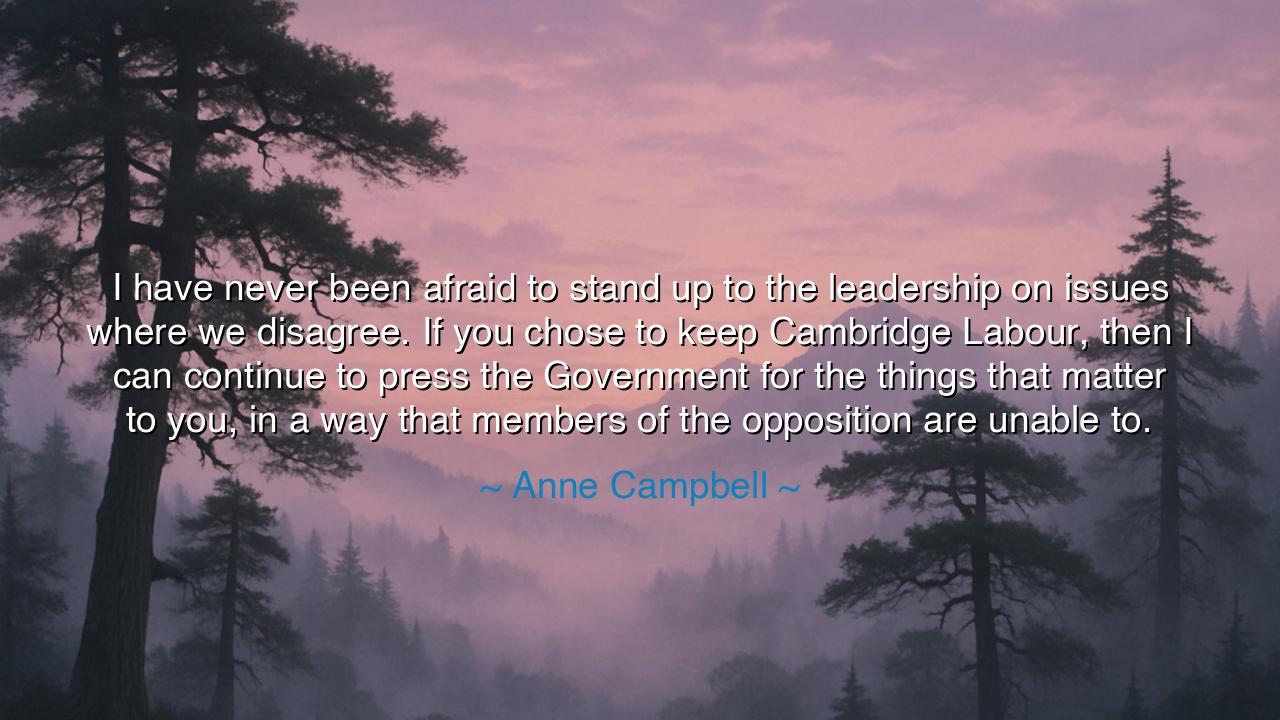
I have never been afraid to stand up to the leadership on issues
I have never been afraid to stand up to the leadership on issues where we disagree. If you chose to keep Cambridge Labour, then I can continue to press the Government for the things that matter to you, in a way that members of the opposition are unable to.






The words of Anne Campbell — “I have never been afraid to stand up to the leadership on issues where we disagree. If you chose to keep Cambridge Labour, then I can continue to press the Government for the things that matter to you, in a way that members of the opposition are unable to” — reflect the spirit of a leader who walks the fine line between loyalty and integrity. Spoken in the world of politics, yet resonating far beyond it, these words are not merely about party allegiance or parliamentary maneuvering. They are about courage, about the sacred duty of a representative to speak truth even when it opposes power, and about the moral balance between cooperation and conviction. Campbell’s declaration reveals the eternal challenge of leadership: how to serve both conscience and community, both principle and practicality, without surrendering one to the other.
To stand up to leadership is never an easy task, for leadership itself is often clothed in authority, tradition, and fear. Many throughout history have bent under its weight, trading truth for comfort and conviction for approval. Yet Anne Campbell’s words recall a different kind of strength — the strength of those who speak when silence is safer, who dissent not out of rebellion but out of responsibility. Her courage belongs to the lineage of those who understood that loyalty to justice outweighs loyalty to hierarchy. In every age, there are voices like hers: individuals who remain within institutions, not to conform, but to reform; who stay at the table, not to feast, but to fight for the right.
Her statement also reveals a profound understanding of political realism. She reminds her listeners that change is often most effective from within — that influence is born not from isolation, but from presence. When she says, “If you chose to keep Cambridge Labour, then I can continue to press the Government,” she speaks as one who understands the machinery of governance. Opposition may speak loudly, but it seldom moves policy; those within, however, can shape outcomes. Thus, her words are both strategic and selfless. She offers not defiance for its own sake, but constructive challenge — a reminder that reformers must sometimes walk beside those they seek to change, lest they lose the power to reach them.
History is rich with examples of such courageous balance. Consider William Wilberforce, who fought against the slave trade within the British Parliament. He did not abandon his government; he stayed, and within that very system, he planted the seeds of freedom. For decades, he faced scorn, exhaustion, and political isolation. Yet by standing firm — by pressing the government “for the things that matter” — he achieved what outsiders could not: the abolition of slavery. His story, like Campbell’s stance, proves that true leadership is not blind obedience, but faithful persistence within imperfect structures. It is the art of pushing power toward conscience, even when the distance between the two seems insurmountable.
But Campbell’s words carry more than political meaning. They speak to the universal struggle of every soul caught between belonging and belief. In workplaces, families, communities, and nations, we all face moments where truth collides with loyalty. To stand up to “leadership” — whether it is a boss, a tradition, or a social norm — requires both wisdom and humility. The wise do not destroy for the sake of rebellion, nor remain silent for the sake of peace. They discern when to challenge and when to cooperate, knowing that both are tools of progress. This is the essence of what Campbell teaches: that courage and diplomacy are not enemies, but partners in the dance of change.
Her message also reflects the sacred bond between a leader and her people. When she says, “I can continue to press the Government for the things that matter to you,” she places herself not above her constituents, but among them. Her power, she reminds them, is not her own — it is borrowed, entrusted, and bound by duty. Such humility is rare among those who wield influence, for it recognizes that leadership is not domination but service. The true leader, as the ancients taught, is not the one who commands from on high, but the one who carries the burdens of many, even when it means standing against her own.
The lesson of Anne Campbell’s words is therefore both moral and practical: remain steadfast in your convictions, but work from where your voice can make a difference. Do not mistake withdrawal for integrity or silence for peace. True strength lies in engaged resistance — in staying within the system to change it, in speaking truth with respect, in opposing without hatred. Whether in politics, community, or personal life, every person will one day face the test she describes: to either yield to authority for comfort or rise against it for conscience.
So let these words be remembered not only as a politician’s defense, but as a timeless teaching: never fear to stand for what is right, even among those you serve or support. Be loyal, but not blind; be courageous, but not reckless. Work with the powers that be when it serves the good, and challenge them when it does not. For the world is not changed by those who abandon the struggle, but by those who stay within it — steadfast, unafraid, and guided always by the light of truth.






AAdministratorAdministrator
Welcome, honored guests. Please leave a comment, we will respond soon